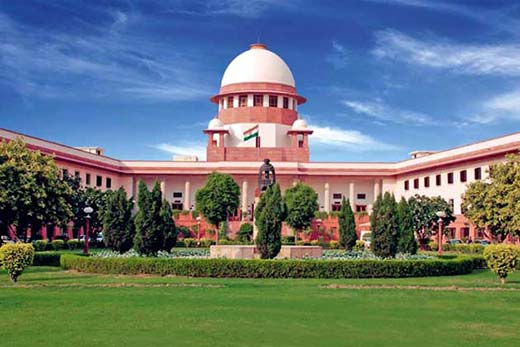by Basit Amin Makhdoomi
Chief Justice Patanjali Sastri in VG Row (1951) historically held that the Supreme Court has been assigned the role of a sentinel on the qui vive. “As a sentinel on Qui Vive, while the Court naturally attaches great weight to the legislative judgment, it cannot desert its own duty to determine finally the constitutionality of an impugned statute. It is both the first court as well as the court of last resort for the protection of rights,” he observed.

The forefathers of our nation immediately after independence blessed us with a constitution which in turn would safeguard us from all forms of tyranny and absolutism. It was during this nation-building process a question arose regarding devising an institution which would stand up and safeguard the sanctity of this constitution whenever and wherever the need arose. This pivotal duty of championing its safety was entrusted to the Supreme Court of India thereby underlining the magnanimity of the responsibility our Apex Court has been entrusted with.
The track record of our Supreme Court during the past 70 years has been unblemished to a great extent but whenever it faltered to stand up, it dearly cost us our democratic credentials as a nation.
Other than the dark emergency era, the recent few years have seen a decline in the faith the common masses in our judiciary as a protector of our constitution. Several instances in the recent few years have brought to fore examples which have been a let down from this sentinel of justice.
The principle of a free and fair election is considered to be one of the essential features of the Basic Structure Doctrine as laid down in the landmark case of Keshavananda Bharti vs State of Kerala.
The Political Bond
The Supreme Court was under obligation to act against all efforts made to dilute the mechanisms of a free and fair election, but when in electoral bonds matter its jurisdiction was invoked, it looked the other way. Electoral bonds are financial instruments brought in by the current government, which claims they aid transparency in political funding. Potential donors can buy the bonds in denominations of Rs 1,000, Rs 10,000, Rs 1 lakh, Rs 10 lakh and Rs 1 crore from SBI branches and hand them over to a party of their choice. The bonds neither carry the name of the donor nor the recipient.
Both the Election Commission and the Reserve Bank of India expressed serious reservations over the electoral bond scheme but even this didn’t give the necessary impetus to stay it, till the time the legality of this scheme was finally decided. With the matter still pending before our Apex Court and the scheme still operational many have aspersions on the quality of democracy we enjoy in India.
Article 370
The other contentious instance when our Judiciary was subjected to a litmus test was when the Parliament of India decided to abrogate Article 370 of the constitution, which conferred special status to the erstwhile state of J&K.
When the aggrieved sought intervention of the Apex Court, the litigants were distraught to see the lack of pro-activeness on the part of this sentinel of justice. With the matter still pending and the judiciary yet to decide on the legitimacy of the action, seemingly the executive has taken it as an approval to the move.
There is no denial of the fact that the Apex Court has enormous power to set back the clock if and when the August 5th Act 2019 is found to be ultra-vires, but how pragmatic will it be for the executing agencies to restore the status quo ante several years after the illegal tinkering happened, is a question very difficult to answer.
It is in times like these the Courts are vested with powers to put an interim stay on such matters which might cause an irreparable loss to one of the litigating parties, till the matters are finally disposed on merits.
The Internet Ban
The Supreme Court in Anuradha Bhasin vs Union of India held that the right to access information through the internet was a fundamental right protected by the Constitution, that orders banning internet services must be made public and reviewed on a regular basis. However, the Court did not actually examine the Kashmir internet ban on the basis of these principles. Months later, failure on the part of the govt in implementing the Apex Court judgement constrained Foundation for Media Professionals and Private Schools Association of Jammu and Kashmir seeking restoration of 4G in the Union Territory on grounds such as the right to access doctors keeping in view the Covid-19 pandemic.
The court justified its infirmities in passing orders on restoring 4G in Jammu and Kashmir citing its duty to balance the rights of the citizens with national security concerns. Despite agreeing with the petitioners on several counts, the court refused to invalidate the suspension orders. It held that while the petitioners’ submission would merit consideration in “normal circumstances”, the present situation in Jammu and Kashmir is “compelling” and warrants consideration.
The Court didn’t stop here but went ahead and delegated its constitutional responsibility of adjudication upon issues concerning fundamental rights to a party which is a stakeholder to the matter, throwing principles of natural justice into oblivion.
Senior Advocate Arvind Datar expounded this grim situation in his article The dangers of outsourcing Justice in the following words:
“By tossing this important writ petition into the lap of the executive, this Bench has achieved the unique distinction of converting judicial review of executive action into the executive review of executive action. The judgment is even more remarkable as it does not set any timeline to complete this executive review and “advise” the Government. Indeed, justice outsourced is justice denied.”
On CAA
A similar abdication was noticed when the Citizenship Amendment Act was passed. On its passage protests broke out across India, a few of them even turned violent. The act offers amnesty to non-Muslim illegal immigrants from three countries – Pakistan, Bangladesh and Afghanistan. Aggrieved citizens invoked the jurisdiction of Supreme Court filing petitions arguing that the law is illegal as it grants citizenship on the basis of religion – which goes against the country’s secular values enshrined in its constitution. There was not any response from the Apex Court on this.
The Habeas Corpus
Recent years have also witnessed how habeas corpus writs, which were assigned priority since ages have been left in the backburner only to become infructuous in nature. Post 370 Abrogation several mainstream leaders were detained arbitrarily but rarely did the Supreme Court pass orders granting any relief.
The initial hesitation of our Apex Court in questioning the policies of government for tackling the migrant crisis during the lockdown period was widely panned by one and all. The disparaging tone with which SC initially spoke about migrants walking home might never be forgotten.
All the incidents mentioned supra amply demonstrate the laxity our sentinel on qui vive could be accused of for not taking the controversial issues head-on, thereby decrying duties it has been reposed with by the constitution-makers of this country.
Upholding Sanctity
While all this was happening in India, similar institutions in other parts of the world have raised the bar.
Last year the United Kingdom Supreme Court, braving all odds, unanimously stuck down PM Boris Johnson’s act of suspending the UK Parliament in a bid to a hassle-free Brexit passage. Had the UK Supreme Court also deferred its hearing citing procedural and technical reasons as are frequently cited in India, the legitimate Brexit exercise would have had to carry a blot deep down the annals of UK history.
Similarly in the US, the US Supreme Court judges showcased the strength of their judicial setup when 4 out of 9 Judges dissented against a majority judgement approving an embargo of President Trump on selective emigrant entry into the United States.
Uphold Rule of Law
Chief Justice Harilal Kania had said at the inauguration of the Supreme Court that the court must be “quite untouchable by the legislature or the executive authority in the performance of its duties”.
The words resonate more ferociously than they would have in times of their making. The diversity of this country is going through a very tough time when certain segments of our society are feeling vulnerable because of the shifting dynamics of the political issues. Hate is freely being spewed, extremism is being decorated with jingoism and machoism.
With all this toxicity in our surrounding environment upon whom can a vulnerable citizen of this country pin his hopes? Delaying crucial hearings, shying away from taking up for hearing controversial issues demeans the paramountcy that this institution is bestowed with.
History stands testimony to the fact that whenever our sentinel of justice has shown laxity in speaking up when it mattered most and renounced its constitutional responsibilities the democratic credentials have always gone for tatters.

In 1976 when our judiciary endorsed the arbitrary actions of the executive in ADM Jabalpur vs Shivkant Shukla hell was let loose. Way back in 1976, our Judiciary chose to bend down on its knees before an authoritarian executive and the rest, as they say, is history. It is often said that history repeats itself and the times we live in provide frequent reminders to the sentinel of our Justice to awaken itself from the deep slumber it pretends to be in, or else once again history will have to be very harsh on us while it sits to adjudicate on its role as a bulwark of our constitutional values in these testing times.
( @BasitMakhdoomi is a columnist and lawyer Jammu and Kashmir High Court. The opinions expressed in this article are those of the author’s and do not purport to reflect the opinions or views of Kashmir Life.)















